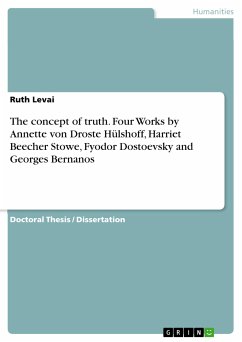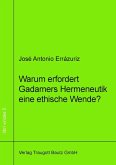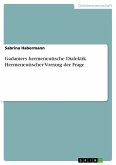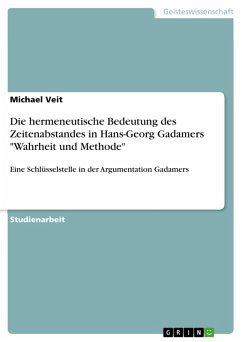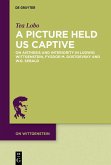Doctoral Thesis / Dissertation from the year 2019 in the subject Philosophy - Philosophy of the 20th century, grade: 4.0, Eötvös Loránd University, language: English, abstract: Is truth necessarily unmediated? If so, can it be grasped/apprehended in its unmediated form? Or is it something that can only be engaged in this present moment in its present form? The structure of the study will be as follows: 1) a brief discussion of the influence of Enlightenment thinking upon German, French, American and Russian literature and/or culture before and throughout the authors' lifetime, 2) an exposition of the aspects of the Enlightenment which were embraced or rejected by the authors, including a comparative look at each of their conversion experiences and how their Christian faith, though members of differing branches thereof, shaped their intellect, 3) an analysis of four specific works by the authors, demonstrating how they coincide with modern notions of truth and even precede recent discoveries about the nature of our reality, 4) and finally a discussion of the aftermath of Enlightenment assumptions in the twentieth century and the effects that they have produced in the modern and postmodern understanding of what constitutes the truth of our reality. Perhaps the key lies in understanding the ambivalence of mimesis itself, an imprecise concept which encompasses both what modern French philosopher Jean-Luc Marion would call the icon and the idol. Speaking of representation as a conduit of truth vs. a conduit of falsehood, or the icon versus the idol Marion writes: The icon...attempts to...allow that the visible not cease to refer to an other than itself, without, however, that other ever being reproduced in the visible...it teaches the gaze, thus does not cease to correct it in order that it go back from visible to visible as far as the end of infinity, to find in infinity something new...the gaze can never rest or settle if it looks at an icon...in this sense, the icon makes visible only by giving rise to an infinite gaze. To find in infinity something new: let this be the defining theme of our study, as it so felicitously encompasses the quest of post-Enlightenment thinkers, including our authors, Droste, Stowe, Dostoevsky and Bernanos, as well as post-relativity physicists, to grasp that reality which maintains its validity by escaping us.
Dieser Download kann aus rechtlichen Gründen nur mit Rechnungsadresse in A, B, BG, CY, CZ, D, DK, EW, E, FIN, F, GR, HR, H, IRL, I, LT, L, LR, M, NL, PL, P, R, S, SLO, SK ausgeliefert werden.

